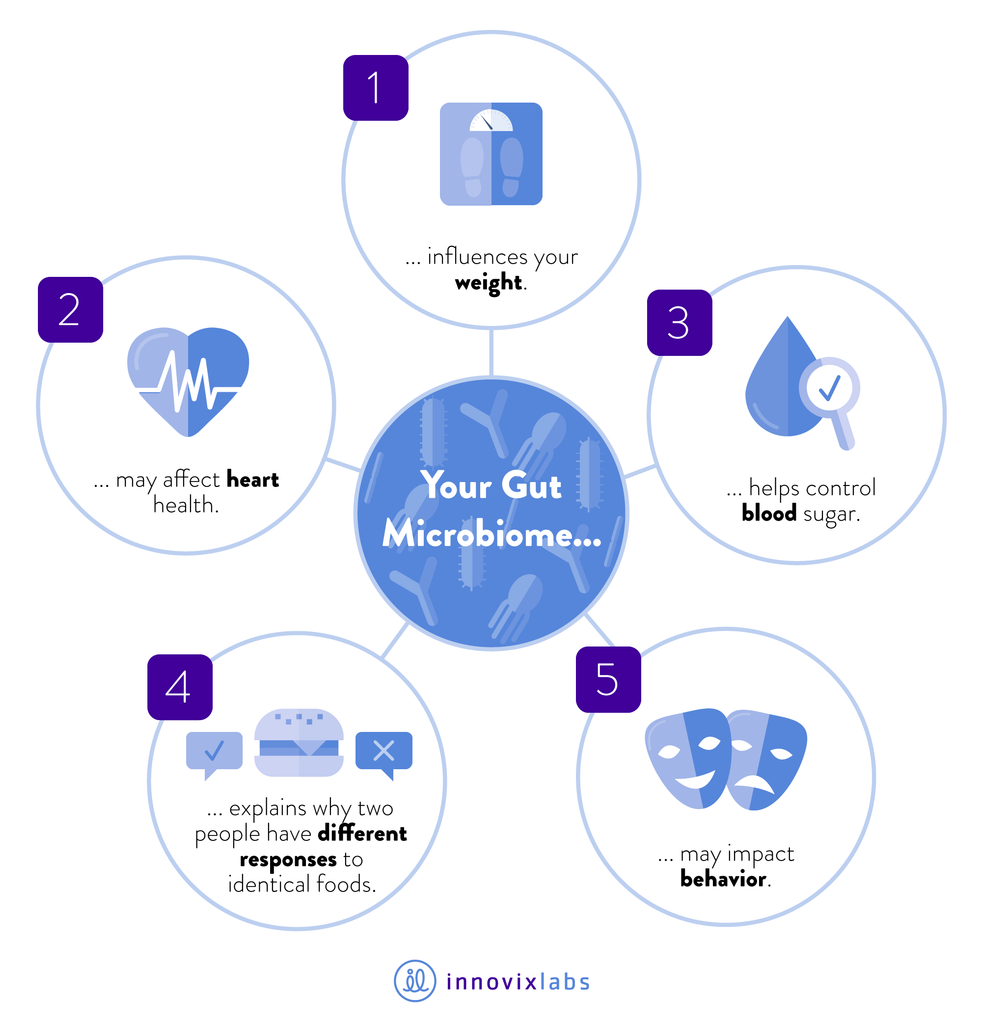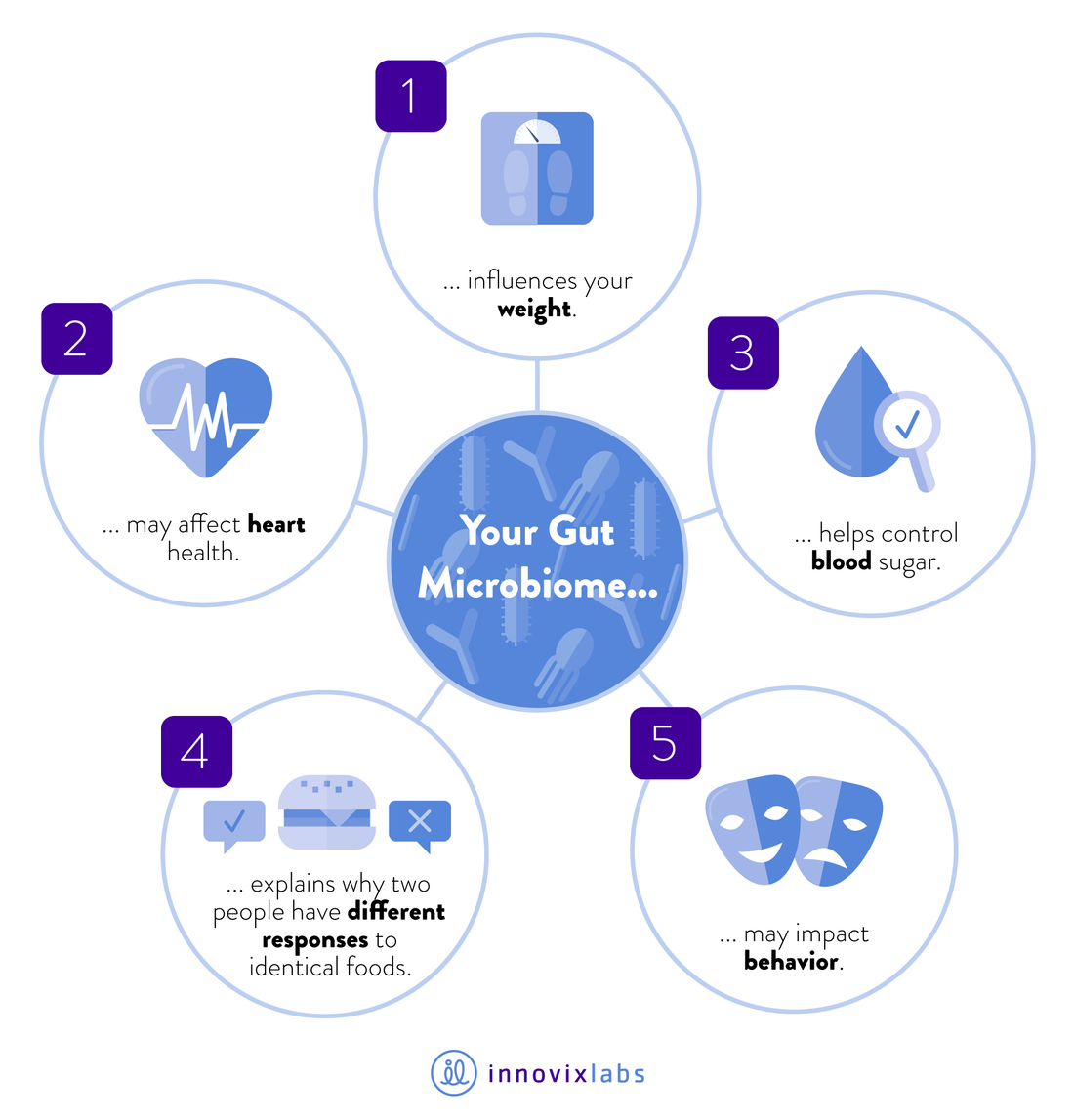
You're more bacteria than human.
That's true based on the number of human cells versus bacterial cells in your body.
Not to be insulting, but you're a bag o' bacteria wearing a human suit.
You share your body with trillions of healthy microorganisms.
These bacteria, or gut microbiome, affect almost every organ of your body. From what we know so far, here are 5 things your gut microbiome can do for you.
1. Your gut microbiome influences your weight
The gut microbiome composition differs depending on whether you are obese or lean, regardless of your diet and genetics.
Scientists have realized that one of the main reasons why you may not be losing weight is because of your gut microbiome. That’s because the microbiota of an obese person is more efficient at extracting energy from food than the microbiota of a lean person.
Good news is that encouraging the presence of the right gut bacteria may help you lose weight and belly fat. (You're still not off the hook about exercise and eating your veggies. Sorry.)
There is some research on bacterial strains causes leanness, but we are far from having commercial probiotic supplements that can promote leanness, let alone compensate for donuts and ice cream.
2. The gut microbiome may affect heart health
Having a healthy balance between good and harmful bacteria in the gut may protect you against heart diseases.
Some bacteria within your gut microbiome may help reduce cholesterol and triglycerides.
Lactobacillus reuteri NCIMB 30242, the probiotic strain found in a product called Cardioviva and Enterococcus faecium M-74, have been shown to lower LDL ("bad") cholesterol levels by a small amount. E. faecium, interestingly, is used to fatten piglets and chickens. It is usually not used sold as supplements because another strain of E. faecium is known to have genes that give it antibiotic resistance. M-74 does not pose that risk.
Neither of these strains raise levels of HDL ("good") cholesterol.
To date, all substances that increase HDL have come with serious side effects. Increasing activity and consumption of healthy fats (olive oil) along with reducing the refined carbs and sugar are safe and acceptable ways of improving HDL numbers.
Like with weight loss, it's early days. Just because we know that gut bacteria can influence body mass index and blood lipids, does not mean that taking a supplement can reduce your risk. We're a long ways from that.
3. It helps control blood sugar
The gut microbiome also may help control blood sugar, which lowers your risk of diabetes.
We know even less about how to manage blood sugar by influencing the microbiome than we do about managing blood lipids. If you enjoy a good science-y geek-fest, this article is a good recap of the state of science.
Metformin is the world's #1 anti-diabetes medication. It's very effective, but we don't really know why it works so well. Part of the reason may be because it alters gut microbiome favorably.
Again, we're far from having a probiotic pill that cures diabetes. Many of the bacteria that seem to influence metabolism cannot be cultured in labs, let alone grown commercially and put into shelf-stable pills.
Diabetes is largely driven by inactivity and excessive consumption of sugar and processed foods. It's unreasonable to expect that probiotics could undo damage caused by bingeing on cookies and Netflix. From that narrow perspective, diabetes is a disease of choice, with lifestyle being both the cause and cure.
Having lost all four of my grandparents to diabetic complications, I have no backdoor exit from my genetics. Lifestyle changes and medications are the only options left.
But it's good to know that a prebiotic fiber-rich diet, along with vigorous activity may help.
Type 1 diabetes is a little different, as it is an auto-immune condition.
People with type 1 diabetes have a dramatically reduced microbiome diversity, due to an overgrowth of unhealthy species just before the onset of diabetes.
4. It explains why two people have different responses to identical foods
Broccoli good. Pizza bad.
But, what if we could splurge on burger and fries every now and then?
Scientists have found that each person metabolizes food very differently. We have vastly different responses to the same food.
We have different responses to identical meals.
Gut microbiota explain why the same diet does not work the same way for everyone.
5. It may impact behavior
Changing the gut microbiota could be a way to affect human behavior – especially when facing threatening situations such stress, mood and anxiety disorders, or impaired memory.
The best example of gut-brain axis is the commonly reported diarrhea or constipation (nervous butt) under stress or butterflies in your stomach when you fall in love.
That's your gut bugs working.
Summary:
- There are a number of ways in which the gut microbiota can influence key bodily functions beyond your gut health.
- Your gut microbiota may influence your weight, heart health, behavior and even your weight.
Stuff that must be said:
We sell probiotic supplements on this website. It goes without saying (but we’ll say it anyway) that we do not make any claims that taking our probiotic supplements will make you lose weight, reduce your cardiovascular risk, or improve your blood sugar simply by taking a pill. This article is about the entire gut microbiota, which may consist of several hundred species of bacteria. This article it is not about probiotic supplements or its benefits. Supplements may help, but supplements alone will not restore you to complete health. We think supplements are a small piece of the health puzzle. You cannot outrun a bad diet and inactivity with pills. Most of the heavy lifting involved in restoring your health will have to come from you in the form of healthy eating and lifestyle corrections. In this article and the ones that follow, we are merely sharing our excitement about developments in this new frontier of science and doing our best to translate dense science into easy-to-read English. We geek out on nutrition science and we think you will too. We hope it makes you a more informed consumer. Our Legal Dept says the same thing in Legalese at the bottom of this page. Enjoy.
References:
Turnbaugh PJ, Ley RE, Mahowald MA, et al. An obesity-associated gut microbiome with increased capacity for energy harvest.Nature. 2006; 444(7122):1027-31.
Sanchez M, Darimont C, Drapeau V, et al. Effect of Lactobacillus rhamnosus CGMCC1.3724 supplementation on weight loss and maintenance in obese men and women. Br J Nutr. 2014; 111(8):1507-19.
Chen ML, Yi L, Zhang Y, et al. Resveratrol attenuates trimethylamine-N-oxide (TMAO)-induced atherosclerosis by regulating TMAO synthesis and bile acid metabolism via remodeling of the gut microbiota.MBio. 2016; 7(2):e02210-15.
Fu J, Bonder MJ, Cenit MC, et al. The gut microbiome contributes to a substantial proportion of the variation in blood lipids. Circ Res. 2015; 117(9):817-24.
Kostic AD, Gevers D, Siljander H, et al. The dynamics of the human infant gut microbiome in development and in progression toward type 1 diabetes. Cell Host Microbe. 2015; 17(2):260-73.
Zeevi D, Korem T, Zmora N, et al. Personalized nutrition by prediction of glycemic responses. Cell. 2015; 163(5):1079-94.
Dinan TG, Cryan JF. Gut instincts: microbiota as a key regulator of brain development, ageing and neurodegeneration. J Physiol. 2017; 595():489-503.

